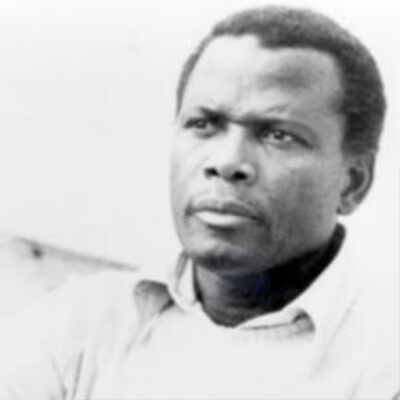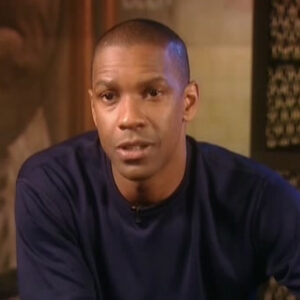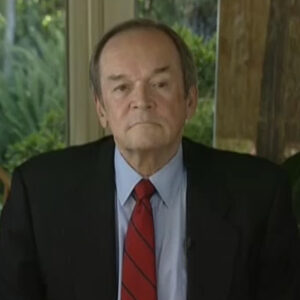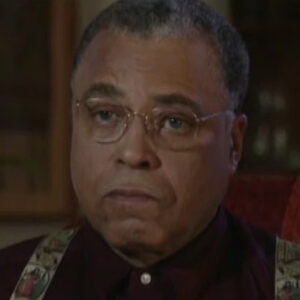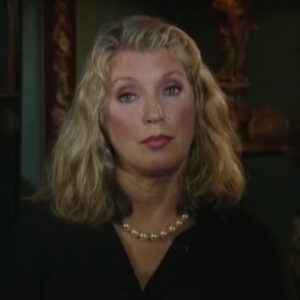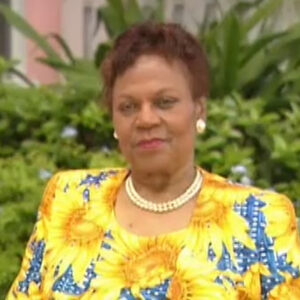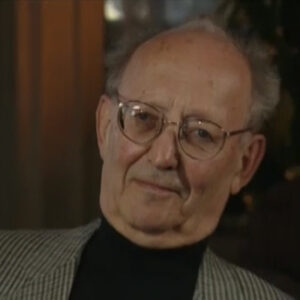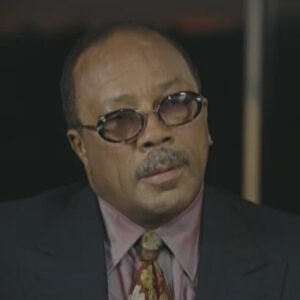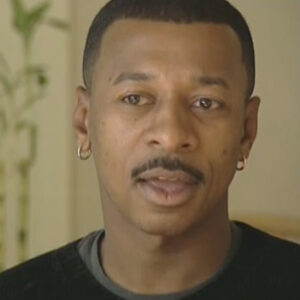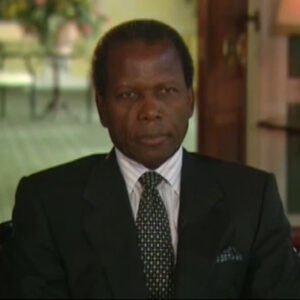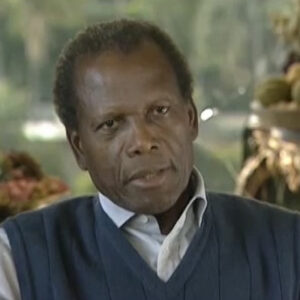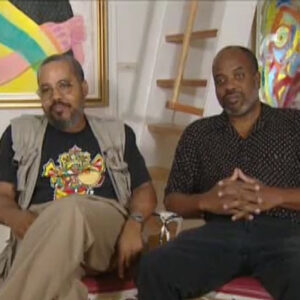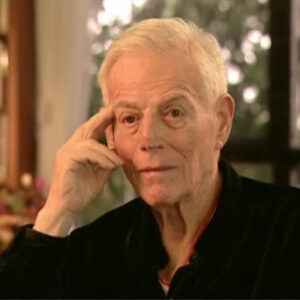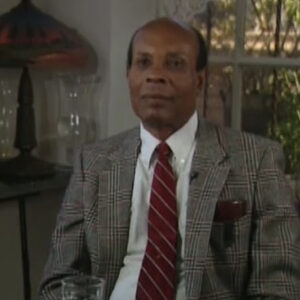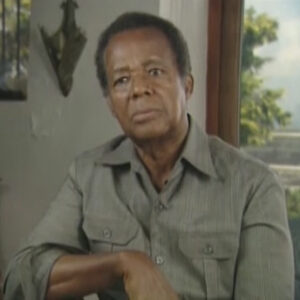Speaker You were born in 1972. Yeah, and that was the year that Sidney directed his first film feature.
Speaker You didn’t know that? I didn’t know that.
Speaker What do you remember most about growing up under the umbrella of your father’s celebrity?
Speaker I think to me, it was all very separate. I think that I didn’t I I couldn’t conceive of the actor side of it.
Speaker You know, he was Danny, he was just my dad. And I didn’t I don’t think until I was older, maybe like 16, 17, that I realized that I appreciated him as an actor. You know, I think that I just kept two separate people in my mind, you know, that he wasn’t he wasn’t the person that everyone was going crazy about. And I didn’t know him in that sense, really. You know, I knew him as my dad.
Speaker So that part of the celebrity was kept very far from your life growing up?
Speaker Partially. I mean, we were, you know, on location with him and stuff like that. Like we lived in Arizona for a while. I went to school in Arizona because he was working there doing stir crazy. But it didn’t. It was normal to me. It was all just normal. He was going to work, you know, coming home. It was just it was a very normal childhood. You know, it doesn’t I guess looking at it from the outside, it has a sort of there’s something different about it. But to me, it was all very just normal. Just normal. Happy childhood, you know, it wasn’t.
Speaker There was never really.
Speaker It’s almost the difference between the image and the person that, you know, I knew the person.
Speaker Sure. So that even our image of you saying where their family disruptions because of his work or things like that, it was a..
Speaker Because if he had to go somewhere, I first of all, he didn’t really go on vacation when I was young. And if you did, we went with him, you know. So it was it was all I mean, just it was all just so normal. You know, Daddy had to work in Arizona, so we’re going with him.
Speaker You know, yeah, so family, which seems for your moment and for your dad to be the most important thing, was the most important thing in your life growing up. Yeah, talk about that. Well.
Speaker It was my childhood and your sense of family. All right, I have very strong sense of family. I mean, I think that, you know, both of my parents and my sister and my closest friends and I think that. Just the way they were both always, just always, always there, you know, when I came home from school or, you know, they didn’t take trips without us, we were all just very, very close knit.
Speaker You know, we weren’t we weren’t separated from each other.
Speaker Right.
Speaker So you went on vacation with your dad. You were always together.
Speaker Did you were you ever taken to award ceremonies when you were kids? Yeah, we went to the Academy Awards once.
Speaker And did you have a sense then how old were you? When did you have a sense then that your dad might be a celebrity?
Speaker Yeah, I think I always had a sense, but it wasn’t say that back to me because my voice is not going to be OK.
Speaker I always had and I always knew that he was a celebrity. But it.
Speaker It was just normal, you know, it was the only thing I knew, I didn’t, you know, I wasn’t sort of thrown into this other life, you know, this was my life and it was all just accepted it. That’s my life, you know. And so I knew I was aware of the whole celebrity thing, but it didn’t it didn’t come into play. It didn’t come into play in my life. Do you know what I mean? Like, perfect. Yeah. It didn’t affect me, really. I mean, we went to the Academy Awards.
Speaker But.
Speaker And I don’t know, it just it’s hard to explain because it was just all so normal, you know, just normal.
Speaker Yeah, it was his work ever discussed at home? We were part of a discussion of his work.
Speaker In terms of what he would do, I know, I mean, you know. No, just, you know, jokingly here and there, I remember comments I would make about, you know, like I used to make jokes about the title of Stir Crazy because I didn’t know what it was about. So I thought it was, you know, someone stirring crazy. And I was like 10 years old, like little jokes. And I knew what was going on, but I was never really an issue.
Speaker Why were you taken to see his movies?
Speaker I saw them at the house. I saw them. I’m I don’t know when it started, but I remember seeing them all through my childhood.
Speaker And did you ever have a dichotomy between that the man up on the screen and the man who told you to go to bed?
Speaker Now, again, normal. Yeah, I mean, I think. And I think that, you know, again, looking at looking at it from the outside, it seems like it would be hard to distinguish or you know, but it’s just when that’s all you really know, it’s just, you know, there’s no qualms about it.
Speaker Question on which which are your favorite films of his ones that he acted in and then ones that he directed, the one he directed.
Speaker And I think that I like the most as Fastforward. Because it’s singing and dancing and I remember him making it and I was going to the set and I just.
Speaker Oh, I can’t even remember I don’t remember the name. I must have been like 13, 13, 14, maybe younger.
Speaker Yeah, I remember watching it over and over and over and over again. And I knew all the dance steps and all the songs.
Speaker And acting.
Speaker I think.
Speaker I would have to say lilies in the field, because I remember watching that we used to have a big projector and we’d watch, like, you know, materials up and watch the films. I remember watching that and just being.
Speaker Amazed, just I don’t know exactly what it was, I was so young, I think I remember sitting kind of in awe of the film.
Speaker Time is ease and comfort probably isn’t the charm and the grace of it, yeah, it’s a beautiful film, you know, it’s.
Speaker You know, it’s just it’s so it’s just it’s very touching. I mean, the performance, everything is just a beautiful film.
Speaker Do you remember ever seeing Raisin in the Sun?
Speaker It’s probably too far, and then I remember I just was thinking, because you were talking about working on emotion. You know, and that’s what you’re going through. That would be a very interesting thing for you to just go back and play Raisin in the Sun, because Sidney in that was so full all the time and the emotion went in so many places that just as a genetic forebear of yours need to focus your his emotion flows through you.
Speaker You know that it would be a fascinating thing for you to say, well, wait until the.
Speaker Tell me about Sydney speaking at your at your graduation.
Speaker He wouldn’t tell me I kept bugging him to tell them.
Speaker Tell me about the speech he was going to make at my college graduation. And he wouldn’t tell me. He wouldn’t tell them and he wouldn’t tell me. So I just I mean, I was surprised. It was good. It was really it was really sweet. He talked about how you sent Sarah Lawrence, the daughter, and they sent back a person with opinions and all sorts of stuff. It was really great.
Speaker It was nice also to have him there when I got the diploma, you know, because, you know, it’s just. It’s a special time, you know.
Speaker Yeah, so you kept bugging him?
Speaker I did, I wanted to know, I wanted to know and he was going to say what I was going to say about me. You know, I wanted to be prepared. He’d say something that you did.
Speaker What would you say? Well, I didn’t know, you know, your dad and you think, you know, it’s going to talk about you and your baby or, you know, I don’t know. Don’t embarrass me. Yeah. Yeah.
Speaker Did your parents encourage you and your sister to become.
Speaker I think there’s a part of whatever we want to do. I remember when we were younger, you know, they wanted us to be doctors and lawyers, teachers, but I think whatever it is that makes us happy, they want for us, you know.
Speaker And, you know, I don’t know. I mean.
Speaker I think my dad would be happy if I was a painter for some reason. I don’t know why, but he’s happy that I’m pursuing something that I love.
Speaker And how did your father’s career influence your choices in life or or didn’t it?
Speaker It definitely did it. Definitely my father’s influence influenced my choices in life, definitely. I think that.
Speaker I think his integrity and his he has such a strong value system and I think that that. That I have learned from him and I therefore adopted you a sense of integrity and somewhat similar value system that influences every aspect of my life, from acting to relationships to everything.
Speaker I think that I mean, one thing that he used to say to me when I was younger was that you would ask for my word and tell me that a person is only as good as their word.
Speaker And I used to always just, you know, babble and babble and babble when I was talking to him to make sure I was exactly telling that exact event, you know, so that I wasn’t so that my words were completely honest, you know, but it’s definitely influenced me.
Speaker Do you think that you’ve got a sense if you were watching him at all or going on location, seeing his kind of the intense involvement that he has at work and the kind of passion he has for it, that that makes you want to have the same thing?
Speaker All I see is passion in life, I think, and I think that I do strive for that, you know, to he he’s got an immense. Love for life and a passion that.
Speaker Sort of. Gives him this limitless.
Speaker Energy, you know, there’s I don’t think that there’s anything that he can’t do because of his passion.
Speaker So would you say you worship him a little bit? Of course, of course. Well, first I worship him.
Speaker Yeah, so sweet.
Speaker Have the two of you ever work together now to look forward to it? I do. I do look forward to working with him as an actor. Do you want him to direct you? I think I’d like to work with him as an actor.
Speaker Tell me, what was your relationship to your dad growing up was and your mom, who was the disciplinarian in the house?
Speaker My dad was a disciplinarian, definitely. Definitely, but in a very gentle way.
Speaker You know, like if I got in trouble, which I did a lot, he wouldn’t yell, you know, he wouldn’t scream or anything like that. He would just say, you know, I love you. You know what you did wrong. And, you know, you know, you’re going to have to be punished. But she was just even worse than yelling or screaming. It was like it was disappointment, you know, but it was it was it was they they always sort of balanced it out, you know, and they always agreed I could never pull, you know, ask my mom one thing. And she said, no, go ask my dad. It didn’t work. You drive. Yeah, many times.
Speaker What was it like growing up in L.A.? Why don’t you I mean, what do you feel about L.A.?
Speaker Well, I left L.A. when I was 18, so as soon as I could, I got out of there. I think that I think it was a great place for me to grow up.
Speaker But considering but I want to do and the business in L.A., I just prefer to work in New York. And I love New York in the city. You know, I like the people. And I just think that there’s more respect for the art in New York than there is in L.A. It’s much more business oriented.
Speaker And I think I know what you’re doing now in terms of acting and studying and working here. And there are little things I don’t want to rush anything.
Speaker I want to be prepared, you know, and I you.
Speaker Is it giving you the satisfaction that you want to make a.
Speaker Acting, yeah, yeah, but it’s giving me the satisfaction that I wanted and then some, I think.
Speaker When you go to the Bahamas and you’ve been going to the Bahamas, what is different about it there for you?
Speaker There’s almost a sense of freedom, you know, a center in the Bahamas, there’s. A sense there’s a freedom of self-expression.
Speaker I think that as is unique.
Speaker And it’s just a very it’s a very generous, very loving place, the beautiful place, and the people are very beautiful, I think. Yeah.
Speaker Do you have a sense of roots going there the way your father does?
Speaker I do. You do. I do have a sense of roots in the Bahamas. I think that in a sense, even though I haven’t lived there, I when I was a baby, I did. But, you know, as an adult, I haven’t lived there.
Speaker But I have there’s a very strong.
Speaker Sense of family from for me there, you know, there’s very strong bonds to the people in my family and in the Bahamas, you know, the time has gone to live in Cat Island.
Speaker What do you think about that? I think it’s a way for the siren to go by.
Speaker OK, I think it’s wonderful that Pam is living in Cairo, and I know she’s been wanting to for a very long time now.
Speaker I think it’s amazing when you understand I kind of need to go back.
Speaker I can. Yes, I definitely can understand her. Need to go back. It’s I don’t know if I can explain it, but I can definitely understand it.
Speaker Well, what else is there that you would like to say about your father and his relationship to you?
Speaker Well.
Speaker He’s I mean, he’s definitely been.
Speaker My guiding light, you know, I definitely.
Speaker He he is what I strive to beat, to become one day, and I think that we have, aside from an amazing father daughter relationship, we have a pretty amazing teacher student relationship on most you know, there’s so much that I learn from him daily.
Speaker I mean, this is one of my best friends I can say here, yeah, so he’s going to be very pleased.
Speaker I think it’s great.
Speaker Joanna did with you. Is there anything else that you guys can think of improved since you were you were you made aware was there ever any problem with this being an interracial marriage and you being a biracial child?
Speaker No, I mean, no.
Speaker Repeatedly, there’s never been any issues with, you know, parents being an interracial couple or me being a biracial child within, you know, our family and friends. I know that when I went to college, people had problems with it.
Speaker But, you know, that’s their problem. It didn’t. It never.
Speaker It never sort of I never allowed it to enter my life because it’s.
Speaker I don’t know how to explain it, it was like.
Speaker I call I actually remember calling my dad once because someone had made a comment to me about it and he said, well, you know, I can’t make everybody happy. I think that’s, you know, that made sense to me because you can’t. And if so, if if someone has a problem with it, then it is not my problem, you know, and I can’t I can’t allow it to affect me, because the fact of the matter is, is that I grew up in a loving family, period. You know, it doesn’t matter what color anyone is, you know.
Speaker So so his his way of teaching you was to say, so what?
Speaker Shrugged it off to not to get antagonistic, not to get hostile, not because, you know, you have to pick your battles and me battling with, you know, one person who made a comment is not going to change the ways of the world. You know, if I if it’s something that I feel I want to address, you know, through my work or through, you know, other means, then that’s one thing.
Speaker But, you know, to pick a fight with somebody over it, that’s just not worth the fight.
Speaker So there’s been very little that’s come your way in terms of in terms of racist bigotry or anything like that.
Speaker You know, there’s been a very there have been incidents, but they’ve been very few.
Speaker Very few, I’ve been very lucky, have.
Speaker And if you could pick an arena to be involved politically, what would it be?
Speaker There’s so many things it’s hard to I would say that I would have to do.
Speaker I would have to do something with human rights and enforcing. The respect of people, I think, would have to do with people, you know, and the way that we treat each other. Something in that, you know, something with, you know, working towards, like, nonviolent. Ways of dealing with people and other countries and things like that.

